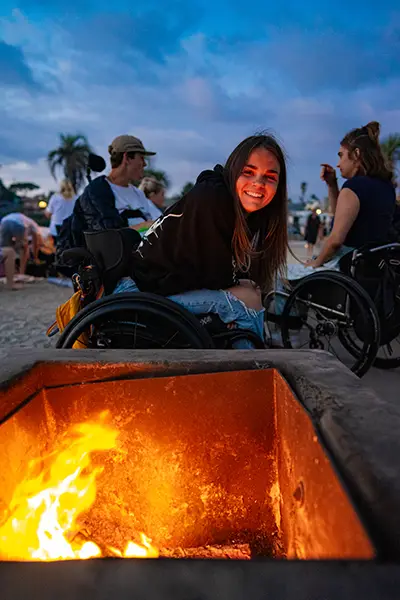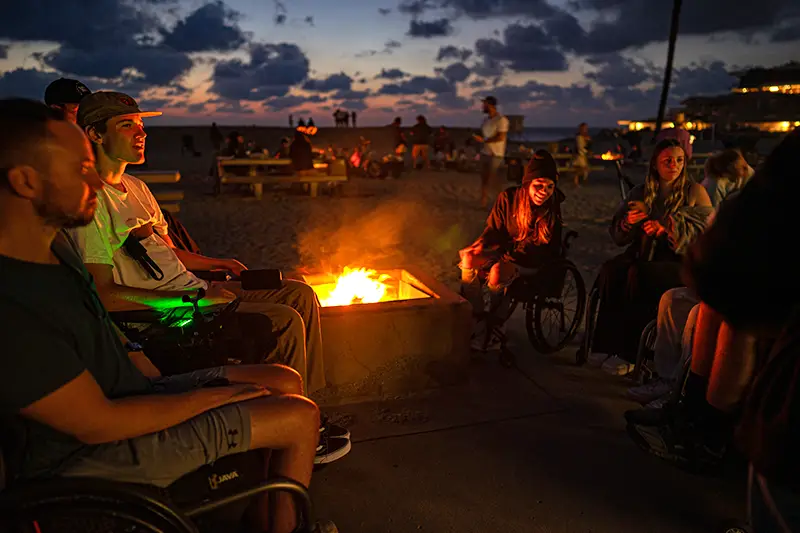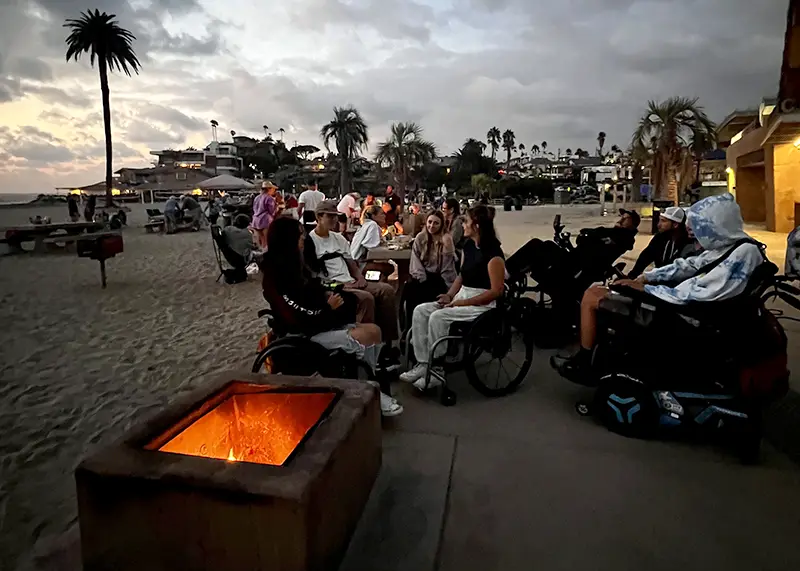My name is Eden Schroeder and I am a 22-year-old C5/6 quadriplegic. I was injured at 18 after a diving accident and I spent six months doing rehab. I ended up being in inpatient rehab for three months, and then outpatient rehab for another three months from December 2020 to May 2021. During my stay at an Atlanta spinal cord injury rehab facility, I held the mindset of doing the most that I could with the function that I had. This is because you can only control what you have control of. I couldn't force my function to come back, but I could learn as much as possible in rehab and strengthen what muscles I had left. By having this mindset so early on in my injury, I was able to develop strong relationships with many of the hospital staff and eventually established a good reputation there.

After my discharge, I kept in contact with a couple of the hospital employees and I would frequently visit. As a result of this, I was one of the few patients selected to be a part of a new program at the hospital called KAYAC, which stands for Keeping Adolescents and Young Adults Connected. Being a part of this program has allowed me to connect with patients who are in the early stages of coping with paralysis. The program's goal is to connect new spinal cord injury (SCI) rehab patients with seasoned spinal cord injury survivors. I am usually paired with people who are close to my age and level of injury. Hearing my experience can be helpful to someone who is newly paralyzed because they can begin to envision what life looks like outside of a hospital setting.
One of the things I've learned from working as a mentor for the past two years is that the mentor-peer relationship is symbiotic; each party benefits in different ways. For the peer, they get to learn helpful tips and tricks for living with paralysis from someone who is similar to them. They also get to see someone continue to build a fulfilling life after sustaining such a life-altering injury. As a mentor, I benefit from this relationship by feeling as if I'm making a difference. There are so many things I wish I had known in the first few stages of adjusting to my spinal cord injury, and now this program allows me to share that knowledge with others. I'm so grateful to be able to make a positive impact at such a pivotal moment in people's lives.
In addition, as a wheelchair user I believe it is incredibly important to have friends within the disability community. This is because living with a disability presents unavoidable adversity. By having a support system of people who "get it" and also experience their own challenges, you can mitigate some of the mental hardships of having a disability. The peer-mentor relationship can be the start of a long-lasting and supportive friendship that benefits both people.

In September 2023 I was able to work with an extremely talented gymnast who broke her neck at 17 years old while attempting a trampoline stunt. This girl was on her way to becoming a professional gymnast and had competed at USA Nationals the year before her accident. When I was assigned to her, I was slightly nervous because she had a little less function in her arms and hands than I did. This made me worry that I wouldn't be helpful as a mentor to her, as I couldn't teach her a lot of the helpful tricks I had learned. During our first session, I was pleasantly surprised by her attitude and willingness to listen to anything I had to say. It's always refreshing when a patient is receptive and grateful to hear what you have to share. I eventually encouraged her to get into the pool as another form of exercise aside from physical therapy. She had previously watched me at swim practice and I told her how it was a great form of exercise for quadriplegics. I also let her know that participating in competitions was also a possibility. Since she returned home, she has sent me videos of her exercising and swimming. She is currently working on flipping over in the water from her stomach to her back in the way that I showed her! Seeing her progress and hearing her stories has been so rewarding for me. I hope to have her as a friend for a long time, and I'm so thankful to have had a role in her life.
I have found a passion for helping adolescents and young adults cope with spinal cord injuries. This along has encouraged me to apply to graduate school for a PsyD in clinical psychology with hopes of specializing in rehab psychology. By earning this degree, I hope to have more knowledge of scientifically proven methods that will help people establish a certain mindset in the beginning stages of adjusting to disability. I truly believe that a "glass half-full" mindset is one of the most crucial elements to living with an acquired disability. Instilling this mindset during injury recovery with new SCI patients would help to set them up for long-term success.

Until I get my degree, I will continue to volunteer both as a peer mentor at the spinal cord injury rehab center in Atlanta and as a virtual peer mentor with the Christopher & Dana Reeve Foundation. Becoming a certified virtual peer mentor with the Christopher & Dana Reeve Foundation was one of the requirements of joining the KAYAC program. To be certified, you have to sign a few forms and attend three virtual training sessions. Eventually, you will be assigned to peers across the country. Similar to KAYAC, I am assigned peers who are my gender and level of injury. Being a virtual peer mentor with the Christopher & Dana Reeve Foundation is a much more accessible option for any spinal cord injury survivors who wish to become a mentor. You can learn more about this program at the Reeve Foundation website.
Photos by Austin Jones
About the Author
Hi! My name is Eden Schroeder and I am a 21-year-old college student studying psychology in hopes of completing my doctorate. I sustained a C5 spinal cord injury in November of 2020 and have since found a passion for adaptive sports. I enjoy traveling, camping, and finding new ways to make the outdoors accessible in my free time. My favorite food is Mexican...especially the cheese dip! I hope you enjoy learning about paraswimming!
Eden's ride is a Quickie Nitrum.
Most of the stories here on LiveQuickie.com were submitted by readers. Do you have a story to tell? We'd love to hear it. Submit your story here.